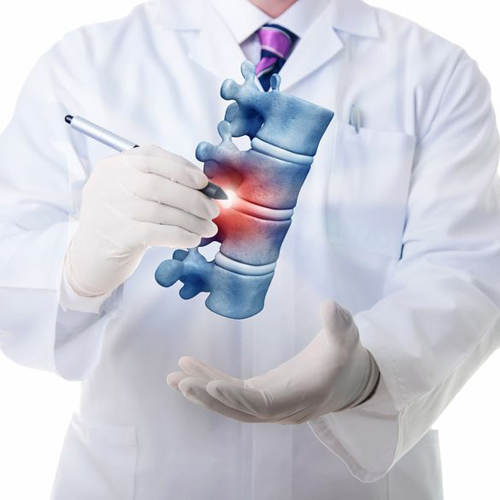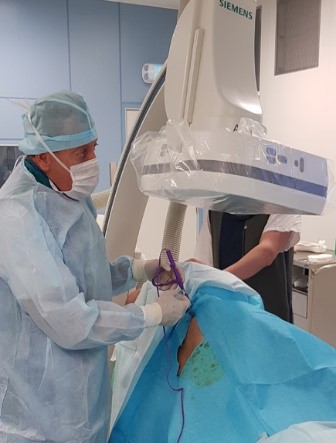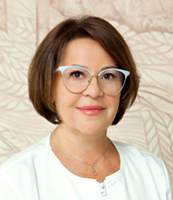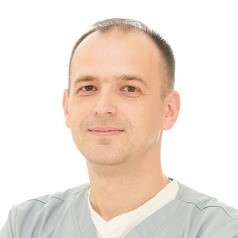
Do you suffer from back pain that prevents you from living a fulfilling life? Contact the specialists of our Center and they will help you solve your problem.
In some cases, radicular pain can be relieved by conservative methods of treatment (pills, injections, physiotherapy).
However, this treatment does not always help. There are side effects and complications beacuse of long-term use of medications. In these cases, patients continue to suffer from severe pain and are forced to resort to a major operation that requires general anesthesia, a long stay in the hospital, and subsequently requires a long period of rehabilitation.
Now DISK-nucleoplasty can change the existing reality!

Nucleoplasty is a safe minimally invasive (by skin puncture) surgery aimed at restoring the structure of the nucleus pulposus, stabilizing the disc wall, and treating nerve endings.
The intervention is carried out under local anesthesia (according to indications - a short-term drug-induced sleep) using modern high-tech equipment of the DISK-FX system and cold plasma.
State Institution “RCMC” is the only Center in the Republic of Belarus where modern minimally invasive interventions are performed for the treatment of acute and chronic pain syndrome in degenerative diseases of the spine
Advantages of the nucleoplasty method:
- no age restrictions;
- maximum accuracy (the operation is performed under X-ray navigation (control).
- minimum duration (the duration of the operation is short, about 20-30 minutes.
- minimal invasiveness
- safety
- the effectiveness of these interventions is 80-90%.
- minimal side effects and complications
- no long-term hospitalization required
- short rehabilitation period.
The aim of the operation is
- restoration of spinal canal structures,
- restoration of the functional properties of the disk,
- elimination of pain syndrome and restoration of conductivity in the nerve roots,
Показания к операции:
- discogenic pain syndrome caused by protrusion (protrusion) or disc herniation up to 7-8 mm in size, occupying no more than 1/3 of the lumen of the spinal canal;
- signs of degenerative changes in the disc (increased intradiscal pressure, partial deformation, internal ruptures and microcracks of the annulus fibrosus);
- discogenic pain syndrome in the lumbar spine with the ineffectiveness of conservative treatment for more than 3 months;
Contraindications:
- pronounced degenerative changes in the disc (the height of the disc is reduced by more than ½, the phenomena of significant dehydration of the disc);
- hernia occupying more than 1/3 of the lumen of the spinal canal;
- sequestered hernia;
- severe degenerative stenosis of the spinal canal with symptoms of compression of the neurovascular structures;
- signs of compression of the spinal roots at the level of 3 adjacent vertebrae;
- increasing neurological symptoms (muscle weakness, paresthesia, signs of paresis, plegia);
- spondylolisthesis; spondylolysis;
- segmental instability of the spine in the area of the affected disc;
- traumatic spinal cord injury;
- the presence of a tumor of the spine;
- the presence of cancer of any localization
- presence of local or generalized infection;
- presence of spinal deformity;
- previous interventions on the intervertebral cartilage at the level of the planned intradiscal procedure.
Do you suffer from back pain that prevents you from living a fulfilling life? Contact the specialists of our Center and they will help you solve your problem.
How to get to the specialists of the Center and subsequently, if necessary, for an operation: you just need to call the call center of our Center and make an appointment with specialists.
 |
Chechik N.M. neurologist of the highest category, kmn, associate professor - consultative appointment. |
 |
To solve the issues of diagnostics and operations in complex cases, our specialists are consulted by Professor Ruven Gepshtein. Professor Reuven Gepshtein is one of the leading Israeli spinal surgeons. Head of the Minimally Invasive Spine Surgery Department of the Hospita «Ассута». |
 |
Patients who have been consulted by a neurologist and have indications for nucleoplasty are referred for a consultation with a neurosurgeon: Kravets OA, neurosurgeon, the highest category. Reception hours: Wednesday 17:00-20:00, office G 112 (by appointment). |
After consulting a neurosurgeon, patients undergo the prescribed preoperative examination:
- general clinical blood test
- RW, HBS antigen, anti-HCV, HIV antibodies
- biochemical blood test: ALT, AST, total protein, total bilirubin, urea, potassium, sodium, glucose, prothrombin, fibrinogen;
- blood type and Rh factor;
- urinalysis;
- coagulogram;
- chest X-ray or fluorography;
- ECG;
- magnetic resonance imaging (MRI) of the region of the spine subject to surgical intervention.
The patient is admitted to the hospital.
Discharge from the hospital is made on the next day after the operation..
The issues of hospitalization and discharge of the patient are decided by the attending physician individually.
You can sign up for a consultation through the call-center by phone (Mon-Fri from 8:00 to 20:00):
+375(17) 543-44-44, +375(44) 510-44-46 (А1) +375(29) 543-44-45(МТС)



